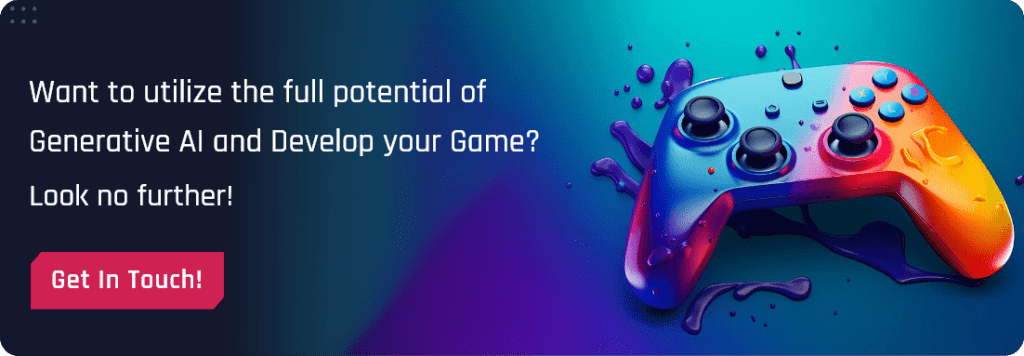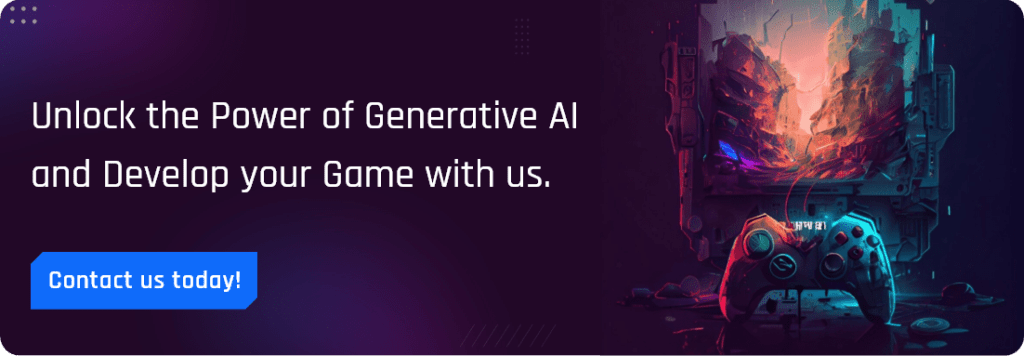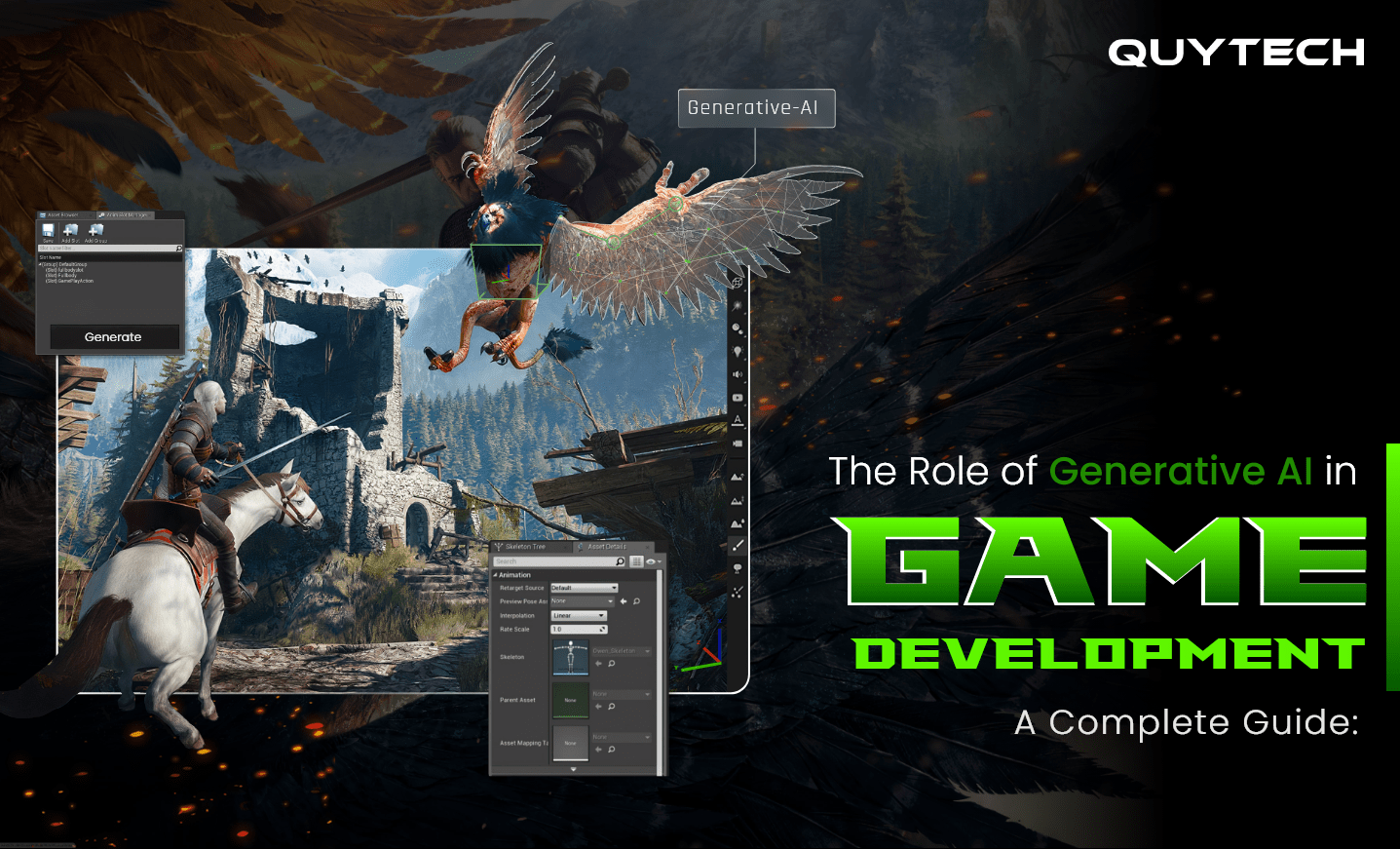In 2024, prominent Generative AI applications such as ChatGPT, Dall-E, and Midjourney seized the world by storm. Half of the population was enthused about this brand-new technology, while the other half was concerned that AI might take over human jobs.
However, when we examine the various industries, we can see that Generative AI is here to aid humans, not to replace them by taking their jobs. Generative AI has proven to be an asset in various fields, including art, content creation, media and entertainment, and even music composition.
An additional sector that can tremendously benefit from Generative AI is Gaming industry. By using Generative AI Development Services gaming industry is evolving very fast, it facilitates the creation of new content rather than repetitive ones, providing a whole new experience to users. Major companies such as Ludo and Minecraft have already embraced Generative AI to develop new games that never bore gamers.
The Current Market Statistics of Generative AI in Gaming Industry
Here are a few interesting statistics about Generative AI for game development.

Source: market.us
- Estimated at USD 10.79 billion in 2022, the global Generative AI market is anticipated to be worth USD 118.06 billion by 2032, increasing at a CAGR of 27.02%.
- Between 2023 and 2032, the global Generative AI in the gaming market is predicted to continue growing at an astounding rate of 23.3%. It is expected to be valued at USD 7,105 MN by 2032.
- According to Market Research Future, the global gaming market will hit the number of USD 546.99 billion by the year 2030.
The future of gaming is very bright. And with the introduction of Generative AI, it will be more optimistic. There are many benefits that Generative AI brings to game development.
In the next section, let us explore the use cases of using Generative AI in gaming industry.
The Use-Cases of Generative AI in Gaming Industry
There are various use cases of Generative AI in game development. We’ll go through them one by one in this part.

- Boosts the Development Process
This is the most common application of Generative AI in the game development business. Game makers can speed up the development process by using Generative AI.
Essentially, game creators can manually construct game elements or use the Procedural Content Generation (PCG) technique. PCG is a widely used technique for autonomously creating and developing various game features such as maps, levels, and characters using various algorithms.
More to this, game developers often use AI-Art generator apps like Midjourney to create art and animation for their games. By using Generative AI, the development process gets accelerated, saving both time and effort for the game developers.
- Dialogue Writing and Storyline Generation
Previously, human intelligence was solely responsible for game dialogue and plot production; but, with generative AI, dialogue writing and storyline generation will be eternally revolutionized.
Generative AI can be used to produce game character dialogue and even assist game developers in creating a unique storyline for the game.
Generative AI can examine existing games and, using Natural Language Processing (NLP), provide game developers with a plethora of new dialogue and storyline possibilities.
- Enhance Non-Player Characters’ Behavior
Game designers can utilize generative AI to train and build the behavior of non-player characters in their games.
NPC behavior can be made more realistic and interactive by game developers. Generative AI can improve NPCs’ decision-making abilities, navigating abilities, and communication with the player and their surroundings.
As a result, NPCs are going to act more genuinely and organically, leading to greater immersive and interesting gameplay experiences.

- Creates Sound and Background Music
Imagine if we revealed to you that all of the sound elements in your favorite game were generated by AI. This is factual. Using generative AI, music and soundtracks could be produced.
Developers can also employ Generative AI to create background music and sound effects for their games. Generative AI can evaluate the gameplay context to generate audio that adapts to the player’s behaviors and the environment.
- Simplifies Testing and Debugging
Finally, it is one of the most important Generative AI application cases in game development. Detecting all of the flaws in a game is a demanding task for any game developer. It takes a tremendous amount of time and effort to catch all of the flaws in the game.
Rather than spending hours analyzing each code, game makers may now employ the Generative AI tool. According to a leading AI app development company, Generative AI scans the code, instantly discovers any mistakes, and fixes them in a matter of seconds.
Advantages of Using Generative AI in Game Development
There are numerous advantages of using Generative AI in game development. We will discuss a few of them in this section:
- Saves Time and Resources
Generative AI has the potential to significantly simplify the work of developers. It automates the formerly time-consuming process of generating games. This allows developers to save time and concentrate on other elements of game development.
- Increases Creativity
Leveraging Generative AI in game design and development offers developers the opportunity to experiment with new ideas and concepts. This way, Generative AI boosts productivity and creativity and allows them to develop more innovative games.
- Enhances Gameplay
Generative AI in game design can improve game mechanics by allowing developers to come up with more nuanced and smart opponents, making games more challenging yet entertaining for players.
- Increases Game Performance
AI can additionally boost game performance, guaranteeing that games operate seamlessly across multiple devices and platforms. AI can automatically alter game settings to ensure maximum performance and reduce the likelihood of breakdowns or other technical difficulties by analyzing hardware and software requirements.
- Provides More Personalization
Generative AI is useful in the development of more personalized player experiences. Generative AI can build specific game experiences that appeal to different players by evaluating player behavior and inclinations. This can boost player interest and retention, eventually contributing to more profitable games.

How Generative AI Will Transform the Future of the Gaming Industry
In the coming years, generative AI is set to revolutionize the gaming industry. From autonomous game component generation to game background music composition, this technology can speed up operational processes and improve the overall quality of game content.
With the ability to generate NPC behaviors, levels, and landscapes, and even recommend dialogue and compelling plots, Generative AI will assist emerging game development startups in increasing game production while tailoring it to their market.
As this innovation progresses, we foresee a significant shift in how games are developed and consumed, eventually leading to a greater appeal and realistic gaming experience for gamers all around the world.
Popular Generative AI Tools for Game Development
Here are some of the popular Generative AI tools for game development. Let’s take a look at them:
- Unity ML-Agents
Unity Technologies’ ML-Agents toolbox enables developers to add machine learning and generative AI into their Unity games.
It gives a structure to instruct intelligent agents utilizing techniques such as reinforcement learning, imitation learning, and others. Using ML-Agents, developers of games are able to construct NPCs with complex behaviors, instruct AI opponents, and build procedural content.
- DeepMind Lab
DeepMind Lab is yet another 3D game development tool that offers a setting to train AI agents utilizing reinforcement learning methods. It provides an adaptable structure for creating bespoke gaming scenarios and training agents to traverse and engage inside those settings.
- NVIDIA GANverse3D
GANverse3D is an NVIDIA tool for creating 3D objects and scenarios using generative adversarial networks (GANs). It enables game designers to build and manipulate 3D objects for use in game development.
- OpenAI MuseNet
OpenAI’s MuseNet is a deep learning-powered Generative AI in media and entertainment industry that can generate unique music in a variety of forms and categories. It is capable of producing tunes, melodies, and even symphonic arrangements.
- DeepTest
DeepTest, developed by Microsoft Research, uses methods based on deep learning and machine learning to test apps for software, including games, autonomously.
It utilizes reinforcement learning to investigate various game states and inputs to find probable flaws or crashes.
Conclusion
The gaming business is being highly revolutionized by generative AI. As previously stated in this blog, game development companies and developers can benefit from Generative AI in a variety of ways
Generative AI can help game developers to level up their games by helping them in creating characters that are up-to-mark, with amazing dialogues and storylines, eye-catching graphics, and animation.
In the coming years, we will see definitely witness more realistic and engaging games that will undoubtedly disrupt the business. And, with Generative AI, game production will unquestionably progress to the next level.
So, if you want to develop a game with the help of Generative AI, then you must contact the best game app development company as soon as possible and discuss your idea with the experts.

Frequently Asked Questions
The different use cases of Generative AI in game development are:
– Boosts the development process
– Helps in dialogue writing and storyline generation
– Enhances Non-Player Characters’ Behavior
– Helps in background music composition and creating sound effects
– Helps in testing and debugging games
Some of the popular Generative AI tools for game development are Unity ML-Agents, DeepMind Labs, NVIDIA GANverse3D, OpenAI MuseNet, and DeepTest.
Generative AI saves time and resources, enhances gameplay, increases game performance, provides more personalizations to gamers, and increases the creativity of game developers.





